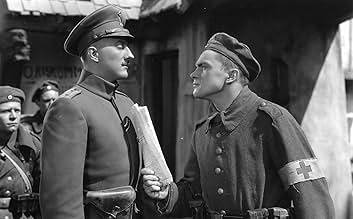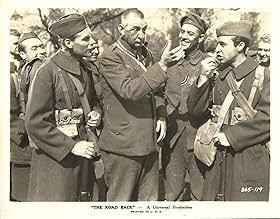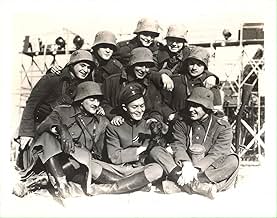Dopo la prima guerra mondiale, un gruppo di ex soldati tedeschi cerca di adattarsi alla vita civile.Dopo la prima guerra mondiale, un gruppo di ex soldati tedeschi cerca di adattarsi alla vita civile.Dopo la prima guerra mondiale, un gruppo di ex soldati tedeschi cerca di adattarsi alla vita civile.
- Regia
- Sceneggiatura
- Star
John 'Dusty' King
- Ernst
- (as John King)
Larry J. Blake
- Weil
- (as Larry Blake)
Recensioni in evidenza
It's basically a sequel to ALL QUIET ON THE WESTERN FRONT, with only Slim Summerville left from the original cast. The screenplay is ambitious, covering four subplots, and I should note that Andy Devine gives a fine performance; it's also nice to watch a camera travel over the slightly redressed exteriors from The Hunchback of Notre Dame.
That said,there's one minor flaw and one major one. The minor one: it's too glossy. ALL QUIET in an exercise in chaos and despair and the battered, crazy shots are part of what make it so good. The world the vets return to is just as chaotic, but everything is glossy, well orchestrated in camerawork and that fights the inherent message.
I could live with that, but the dealbreaker is John "Dusty King. Those of you have seen the Coen brothers' HAIL CAESAR will recall the cowboy star from that movie. He can ride a horse upside down and backwards and rope three steers at the same time. What he can't do is speak two words together, and somehow the New York office wants him to star in a sophisticated comedy. So he does.
Well, that's John "Dusty" King. In what was essentially the Lew Ayres role from ALL QUIET, Mr. King must be the central observer and moral center of the movie. He must speak long speeches. He must tell his leading lady -- an Andrea Leeds type who sounds just like him -- that she can't help him figure out these things, little lady. He stinks up the joint. Within a couple of years he would retreat to B westerns in which he would occasionally sing, and good riddance to him.
A pleasant woman who likes to sit in the front row was telling me that the consideration of what was Remarque's writings on PTSD make it a good film. There's no doubting the intentions, but if intentions were all that mattered, Ed Wood Jr. Would have been a great film maker.
That said,there's one minor flaw and one major one. The minor one: it's too glossy. ALL QUIET in an exercise in chaos and despair and the battered, crazy shots are part of what make it so good. The world the vets return to is just as chaotic, but everything is glossy, well orchestrated in camerawork and that fights the inherent message.
I could live with that, but the dealbreaker is John "Dusty King. Those of you have seen the Coen brothers' HAIL CAESAR will recall the cowboy star from that movie. He can ride a horse upside down and backwards and rope three steers at the same time. What he can't do is speak two words together, and somehow the New York office wants him to star in a sophisticated comedy. So he does.
Well, that's John "Dusty" King. In what was essentially the Lew Ayres role from ALL QUIET, Mr. King must be the central observer and moral center of the movie. He must speak long speeches. He must tell his leading lady -- an Andrea Leeds type who sounds just like him -- that she can't help him figure out these things, little lady. He stinks up the joint. Within a couple of years he would retreat to B westerns in which he would occasionally sing, and good riddance to him.
A pleasant woman who likes to sit in the front row was telling me that the consideration of what was Remarque's writings on PTSD make it a good film. There's no doubting the intentions, but if intentions were all that mattered, Ed Wood Jr. Would have been a great film maker.
In the film Gods and Monsters, Ian McKellen wonderfully plays Whale recalling his hatred of making this film, the film Whale intended to be the crowning achievement of his career.
The first world war was still close to Whale as he made this film nearly 20 years after it ended. Whale intended the film end with a more sarcastic touch of showing the Nazis as war mongers, warping the minds of youths, but the final cut of this film was taken out of his hands.
The Road Back has some signature Whale touches. Yes, the camera dollies through a wall from outside on a street to the inside of a building, following a character entering it. Dwight Frye, Edward Van Sloan, Lionel Atwill and a few other Whale favorites play minor characters with character. He had his usual crew of Ted Kent editing, John Mescall shooting, John Fulton with special effects and the great Charles D. Hall as set designer. You would expect a horror film with all these names. Yet the film does not stand up next to his horror films, nor to Show Boat, Kiss Before the Mirror or Waterloo Bridge. It is a notch below.
It's hard to tell how much of it has to do with the editing. There were also completely unnecessary comedy scenes that did not belong that I understand were re-shot by the orders of studio head Charles D. Rogers, a man who clearly knew nothing of the studio he had taken over from the Laemmles.
Even if Whale had final cut, this film seems like its' story somewhat misses the mark. It works and is an admirable picture, but it seems to lack the scope that would have given it more power. The characters talk about how the war changes them, but we are shown very little of HOW they changed. They seem unhappy, but there is no real emotion. They too often seem like mouthpieces for Whale's beliefs and not like real people. It would have been a better film if it expanded on the souls of the characters and been a half hour longer or so. It probably would have actually moved faster than it does. We go from the war to the classroom to the bars and to the courtroom and it just seems to want to become an epic, but it can't.
Still, this film is worth watching, especially for Whale fans who want to see his last solid, good film. He was never again to be as creative or interested in his stories.
The first world war was still close to Whale as he made this film nearly 20 years after it ended. Whale intended the film end with a more sarcastic touch of showing the Nazis as war mongers, warping the minds of youths, but the final cut of this film was taken out of his hands.
The Road Back has some signature Whale touches. Yes, the camera dollies through a wall from outside on a street to the inside of a building, following a character entering it. Dwight Frye, Edward Van Sloan, Lionel Atwill and a few other Whale favorites play minor characters with character. He had his usual crew of Ted Kent editing, John Mescall shooting, John Fulton with special effects and the great Charles D. Hall as set designer. You would expect a horror film with all these names. Yet the film does not stand up next to his horror films, nor to Show Boat, Kiss Before the Mirror or Waterloo Bridge. It is a notch below.
It's hard to tell how much of it has to do with the editing. There were also completely unnecessary comedy scenes that did not belong that I understand were re-shot by the orders of studio head Charles D. Rogers, a man who clearly knew nothing of the studio he had taken over from the Laemmles.
Even if Whale had final cut, this film seems like its' story somewhat misses the mark. It works and is an admirable picture, but it seems to lack the scope that would have given it more power. The characters talk about how the war changes them, but we are shown very little of HOW they changed. They seem unhappy, but there is no real emotion. They too often seem like mouthpieces for Whale's beliefs and not like real people. It would have been a better film if it expanded on the souls of the characters and been a half hour longer or so. It probably would have actually moved faster than it does. We go from the war to the classroom to the bars and to the courtroom and it just seems to want to become an epic, but it can't.
Still, this film is worth watching, especially for Whale fans who want to see his last solid, good film. He was never again to be as creative or interested in his stories.
In the years following WWI, slowly the former Allied Powers came to realize that this war was a pointless waste of lives. As a result, there were many war films of the 1930s that humanized the German enemy and discussed this new view of this awful war. The problem is, although films like "J'Accuse" and "All Quiet on the Western Front" were right...the timing was poor, as it encouraged these countries to disarm and see the Germans very favorably....just as Hitler was coming into power! Of these anti-war/pro-German films, "The Road Back" is probably the most unfortunately timed, as only a very short time later, the world's love of Germany began to diminish quickly--with Nazis taking over Austria and Czechoslovakia and Kristalnacht, in which Jews were slaughtered. Not surprisingly, the American audiences were no longer eager to see the Germans as victims...and "The Road Back".
The irony to all this is that the original book (by Erich Maria Remarque--the same man who wrote "All Quiet on the Western Front") DID have a strong anti-Nazi message and COULD have been a very effective film in preparing the world for the Nazi menace. Unfortunately, the studio removed this from the film in an attempt to make the movie acceptable abroad...especially in places that were pro-German! In the end, however, no one wanted the picture--the Germans STILL didn't think it was pro-German enough and folks who were scared of the mounting German aggression were not in the mood for such a film! Ultimately, it ended up being shown very few places.
The story begins in the final days of WWI. A group of German soldiers who have managed to remain alive and remain friends are trying to make it out of the war alive. Most do...only to find life back home is not at all easy nor pleasant. Communists at home are calling for revolution and officers returning from the front are attacked. Additionally, food shortages, no jobs and a broken economy spell disaster for the men and their families. In other words...life really sucked. And, it gets even worse when one of them kills a man. Why? Watch the film to find out for yourself.
While the film does not come out with an overtly pro-Nazi message because the Nazis are never mentioned, the film's covert message seems to be "Germany was a mess...until the Nazis came and brought peace and prosperity". Despite this and its strong anti-Communist message*, the German government banned the film anyway. I guess Hitler and his comrades just weren't taking any chances with this movie...though it sure seems like it would have been effective pro-German propaganda if used by them--especially if you chopped off the confusing and unnecessary minute of the picture. As for the quality of the film, it is exceptionally well made and if it weren't for its pro-Nazi bent, it would be a very good film.
* By the way, both the Communists AND Nazis were tearing the nation apart during this post-war period. Both promised prosperity...provided you gave them a free hand to deal with problems their way! Often, this resulted in gun fights in the streets between the two factions....though the film never mentions the Nazi part in all this violence.
The irony to all this is that the original book (by Erich Maria Remarque--the same man who wrote "All Quiet on the Western Front") DID have a strong anti-Nazi message and COULD have been a very effective film in preparing the world for the Nazi menace. Unfortunately, the studio removed this from the film in an attempt to make the movie acceptable abroad...especially in places that were pro-German! In the end, however, no one wanted the picture--the Germans STILL didn't think it was pro-German enough and folks who were scared of the mounting German aggression were not in the mood for such a film! Ultimately, it ended up being shown very few places.
The story begins in the final days of WWI. A group of German soldiers who have managed to remain alive and remain friends are trying to make it out of the war alive. Most do...only to find life back home is not at all easy nor pleasant. Communists at home are calling for revolution and officers returning from the front are attacked. Additionally, food shortages, no jobs and a broken economy spell disaster for the men and their families. In other words...life really sucked. And, it gets even worse when one of them kills a man. Why? Watch the film to find out for yourself.
While the film does not come out with an overtly pro-Nazi message because the Nazis are never mentioned, the film's covert message seems to be "Germany was a mess...until the Nazis came and brought peace and prosperity". Despite this and its strong anti-Communist message*, the German government banned the film anyway. I guess Hitler and his comrades just weren't taking any chances with this movie...though it sure seems like it would have been effective pro-German propaganda if used by them--especially if you chopped off the confusing and unnecessary minute of the picture. As for the quality of the film, it is exceptionally well made and if it weren't for its pro-Nazi bent, it would be a very good film.
* By the way, both the Communists AND Nazis were tearing the nation apart during this post-war period. Both promised prosperity...provided you gave them a free hand to deal with problems their way! Often, this resulted in gun fights in the streets between the two factions....though the film never mentions the Nazi part in all this violence.
Remarque's novel (which I haven't read) Der Weg zurück/The Road Back is a sequel to his All Quiet on the Western Front. Whale's (or rather Universal's) The Road Back has Slim Summerville as Tjaden again and mentions the names of Kat, Detering and Paul Bäumer in order to directly tie on the preceding film's success. Without success. Surely, The Road Back has a great first half, but, alas, a second half which does not hold up very well. Whale's excellent talent in directing is apparent, but as soon as the German soldiers arrive at home after World War I, it drifts too much into sentiment and pathos, without holding back the one or the other really powerful scene, (especially the one in the mental hospital) and some truly wonderful performances by Slim Summerville and Andy Devine. The choreography of the mass scene towards the end is impressive as well (which resembles Eisenstein's famous Odessa shots a lot). So, it's not really forgettable, but slight disappointment nonetheless.
The first part of the film is definitely a masterpiece, with extremely touching scenes from the trenches and unforgettable sequences of the armistice, how it happened and how it was experienced by the soldiers. I never read the book, but naturally the soldiers encounter problems when they are obliged to readjust to peace time life at home among gross political disturbances, introducing new conflicts galore, and here obviously the director had some difficulties keeping up the intensity of the film, as some ladies in action caused some disturbance both to the soldiers and to the film. Nevertheless, the end riot scenes of the film are magnificent and impressing, and the final court proceedings provide a sad finale to the destiny of these soldiers alienated from normal reality, so habituated to handle constant slaughter at war, and so incapable of handling banal crises at home. The spirit of Remarque nevertheless sustains the entire movie, all his stories made as great films as novels, and although this is not the best Remarque film and novel, it certainly is important and ranks as such in the canon. This film is extra added to in quality by Dimitri Tiomkin's very approppriate and inspired music.
Lo sapevi?
- QuizFearful that this film would not do well overseas, the new regime at Universal Pictures severely edited the film before release, removing much of the strongly anti-Nazi slant that author Erich Maria Remarque included in the original novel, and which director James Whale intended to retain in the film version.
- ConnessioniFeatured in Now You See Him: The Invisible Man Revealed! (2000)
I più visti
Accedi per valutare e creare un elenco di titoli salvati per ottenere consigli personalizzati
Dettagli
- Tempo di esecuzione1 ora 40 minuti
- Colore
- Proporzioni
- 1.37 : 1
Contribuisci a questa pagina
Suggerisci una modifica o aggiungi i contenuti mancanti

Divario superiore
By what name was The Road Back (1937) officially released in India in English?
Rispondi





































